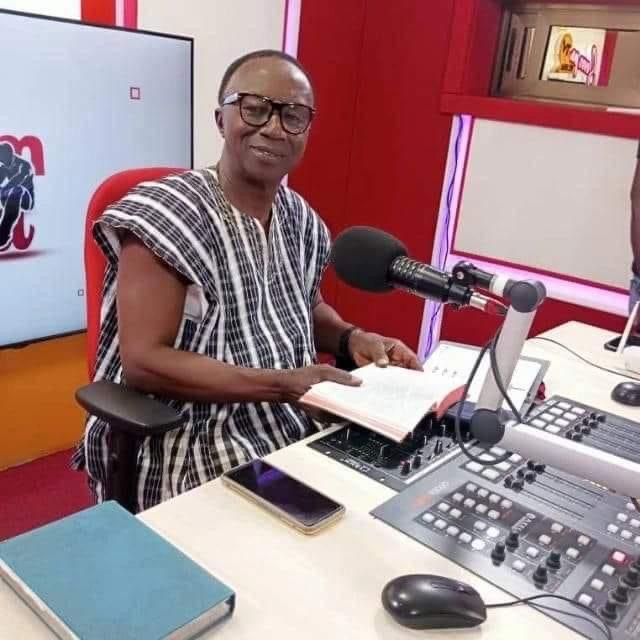The president of the Ghana Publishing Association (GPA) Mr. Asare Konadu Yeboah has conceded to the high price increment charges on books and has begged parents to bear with them regarding the new prices in an interview with Sompa Tv on Thursday, January 12th, 2023.
The president said he could no longer disagree with parents on the new price increment of books which has affected the purchasing power but added High fuel prices, utilities, and discounts given to schools are also noted reasons for hikes.
He said in consultation with the books seller and stakeholders, a consensus has been agreed upon to reduce the discount to the sellers to reduce the new price tag on books.
He attributed the high price partially to the number of pages printed and the size of the books.
“The books are range by pages and are printed by quotations by pages and of course the size of the books, you could see there have been changes on the picture qualities and stuff but the major headache is the paper for the printing.
He added that the publisher must meet the requirements of the National Council for Curriculum Assessment (NACA).
“NACA has designed a specification that the publisher must comply with so you could see that almost all publishers have a similar book size because it's the size given by NACA including font size so all these are factors contributing greatly, he added.
He said the content of the syllabus determined the font size and that affects the pages.
“We are dealing with 14 to 16 font sizes and that determines the number of words per line, the higher the font, the lesser the numbers per line, because NACA believes that the font size should be big enough for the lower primaries so you could see that the primary school's books are even bigger than the secondary and tertiary.
Background
The Ghana National Association of Authors and Publishers (GNAAP) is instituting a new price increment for books and stationery for schools.
The increment which took effect on 8th November 2022 will affect bookshops, basic schools, Junior and pre-tertiary institutions.
GNAAP named the current exchange rates, inflation, payment terms, and interest rates as factors accounting for the increment.
High fuel prices, utilities and discounts given to schools are also noted reasons for hikes.
The GNAAP president, John Akwasi Amponsah, was speaking at the press conference on challenges facing the book industry in recent times.
He mentioned that the dollar to cedis rate has increased importation of stationary materials.
“The exchange rate of the cedi to the dollar has risen from 5.80 to 15cedis and still continues to rise. What this means is that importers of paper and finished products and printing inputs will need more cedis to run a smooth business.
“For example, goods that we needed 62,000 dollars to produce last year alone compared with this year are double the amount that we used. So in effect per the exchange rate, we need a capital investment of the same amount that we invested last year.
“The effect will be that the availability of books will not be forthcoming and secondly if the books are there, parents and schools should expect high prices,” he said.
Mr. Amponsah again stated that port duties have increased twice the previous year.
“Now to offset, last year to offset a 120 feet container required about 40,000 Ghana cedis. This very year that same consignment requires 82,000 to1.2 old currency billion cedis to get the materials needed for the books” he said
The hikes in fuel and diesel prices, according to Mr. Amponsah, are noted to have added to transportation expenses.
“From the beginning of this year till now, fuel price stands at 71%. This affects the transportation of goods to our own respective warehouses. Besides, we spend huge sums of money on transport as we made the effort to send samples of our books to schools.
“It’s not only the government that patronizes the selection and buying of our books. All private schools in Ghana buy books from us but before they get the books, we have to patrol the whole of Ghana individually as Publishers to give samples of our books to them for them to review and get back to us. In the process we do have a huge budget on transport,” he said.
Mr. Amponsah added that most clients which include both private and public have over the years been given a credit facility that extended between three to six months.
This credit facility has been reduced from these months to 30 days.
“For this reason, we are compelled to run on cash and carry basis until the country’s economic situation is stabilized,” he stressed.
He suggested a private-public partnership to run a paper mill to ensure the availability of papers for textbooks.
Source: sompaonline// Eric Murphy Asare













 Sompaonline.com offers its reading audience with a comprehensive online source for up-to-the-minute news about politics, business, entertainment and other issues in Ghana
Sompaonline.com offers its reading audience with a comprehensive online source for up-to-the-minute news about politics, business, entertainment and other issues in Ghana